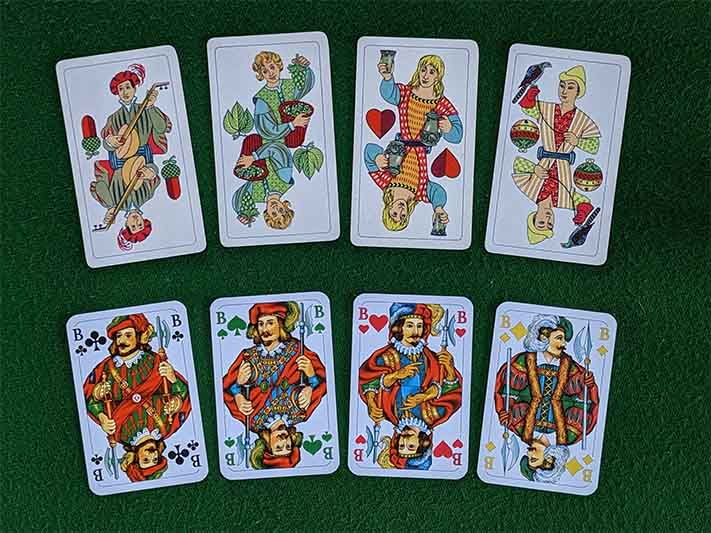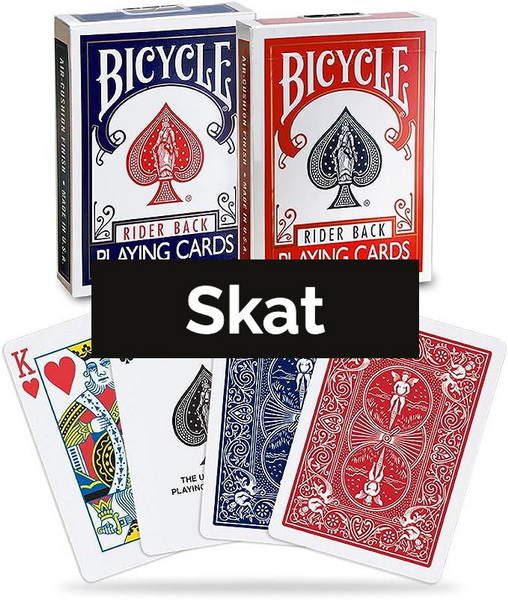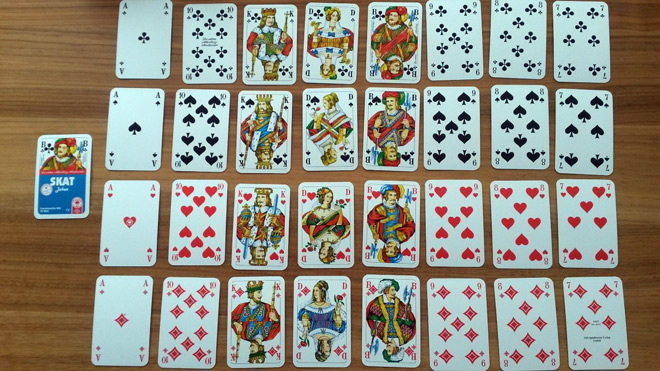Content Menu
● Objective of the Game
● Equipment Needed
● Setup
● Bidding Process
● Game Types
● Playing the Game
● Scoring
● Special Conditions
● Strategies for Winning
● Advanced Strategies
● Variations of Skat
● Conclusion
● Frequently Asked Questions
>> 1. What is Skat?
>> 2. How many cards are used in Skat?
>> 3. What are the main types of games in Skat?
>> 4. How does scoring work in Skat?
>> 5. What happens if I overbid during bidding?
● Citations:
Skat is a traditional German card game that is both strategic and engaging, typically played by three players. It combines elements of bidding, trick-taking, and scoring, making it a complex yet rewarding game. This guide will walk you through the rules, gameplay mechanics, strategies, and tips for mastering Skat.

Objective of the Game
The primary goal in Skat is to accumulate points by winning tricks and fulfilling the contract declared during the bidding phase. The declarer (the player who wins the bid) aims to score at least 61 points from the cards won in tricks. If the declarer bids for a higher score (Schneider or Schwarz), they must achieve even more points.
Equipment Needed
To play Skat, you will need:
- A 32-card deck (Aces through 7s in each suit).
- Three players.
- Pen and paper for scorekeeping.
Setup
The game begins with the dealer distributing cards according to a specific pattern. Each player will receive a total of ten cards as follows:
1. Three cards to each player.
2. Two cards face down in the center (these are known as the Skat).
3. Four more cards to each player.
4. Three final cards to each player.
After dealing, players will have ten cards each, and two cards will remain in the middle as the Skat.
Bidding Process
Bidding is a crucial part of Skat and determines who will be the declarer for that round. The process unfolds as follows:
- The player to the left of the dealer starts the bidding.
- Players can bid based on their assessment of their hand's strength and potential game types.
- Bids can vary based on the type of game they wish to declare: Suit Game, Grand Game, or Null Game.
The highest bidder becomes the declarer, picks up the Skat, adds those two cards to their hand, and discards any two cards back into the Skat.
Game Types
The declarer chooses one of three game types after winning the bid:
- Suit Game: A specific suit is declared as trump (clubs, spades, hearts, or diamonds). The Jacks are always considered high trumps.
- Grand Game: Only Jacks are trumps in this variant.
- Null Game: There are no trumps; the declarer's objective is to lose every trick.
Playing the Game
Once bidding concludes and a contract is declared, gameplay begins with players taking turns playing one card each in a clockwise manner:
- Leading a Trick: The player to the left of the declarer leads first by playing any card from their hand.
- Following Suit: Players must follow suit if they have a card in that suit; if not, they can play any card.
- Winning a Trick: The highest card of the led suit wins unless a trump card is played; in that case, the highest trump wins.
The winner of each trick leads the next one until all ten tricks have been played.
Scoring
At the end of all tricks played, points are counted based on cards won:
- Ace: 11 points
- Ten: 10 points
- King: 4 points
- Queen: 3 points
- Jack: 2 points
- 9, 8, 7: 0 points
The total number of points available in Skat is 120. To win a Suit or Grand game, the declarer must collect at least 61 points; for Schneider (90 points) or Schwarz (winning all tricks), different thresholds apply.

Special Conditions
There are special scoring conditions that can affect gameplay:
- Schneider: If either side scores fewer than 30 points.
- Schwarz: If one side wins all ten tricks.
These conditions can significantly impact scoring multipliers and overall strategy.
Strategies for Winning
To excel at Skat, consider these strategic tips:
- Understand Your Hand: Evaluate your hand thoroughly before bidding; knowing your strengths can help you bid effectively.
- Bidding Wisely: Avoid overbidding; it can lead to significant losses if you fail to meet your declared contract.
- Choose Your Game Type Carefully: Select a game type that complements your hand's strengths—go for Suit Games if you have strong trumps or Null Games if your hand is weak.
- Maximize Scoring Opportunities: Aim for Schneider or Schwarz when possible for additional multipliers and rewards.
Advanced Strategies
As you become more familiar with Skat, consider implementing advanced strategies:
- Card Counting: Keep track of which cards have been played can give you an edge in predicting opponents' hands and making informed decisions during play.
- Psychological Play: Use bluffing techniques during bidding to mislead opponents about your hand's strength. This can be particularly effective if you have a strong hand but want to encourage higher bids from opponents.
- Defensive Play: When not playing as declarer, focus on limiting your opponents' scoring potential by strategically playing high cards when necessary or forcing them into unfavorable plays.
Variations of Skat
While traditional Skat has its own set rules and gameplay style, various regional variations exist that may introduce new elements or change existing ones:
- Hand Games: In some variations, players may choose to play without looking at the Skat for higher multipliers but at greater risk due to not being able to improve their hand.
- Partnership Games: Although typically played by three players individually, some variants allow for partnerships where two players team up against one opponent.
These variations can add depth and excitement to your gameplay experience while also providing opportunities for new strategies and tactics.
Conclusion
Skat is a fascinating card game that requires skillful bidding and strategic play. By understanding its rules and employing effective strategies, players can enhance their chances of winning while enjoying this classic game. Whether you're playing casually with friends or competitively in tournaments, mastering Skat offers an engaging challenge that rewards both skill and strategy.

Frequently Asked Questions
1. What is Skat?
Skat is a traditional German card game designed for three players that involves bidding and trick-taking elements.
2. How many cards are used in Skat?
A total of 32 cards are used in Skat, consisting of Aces through Sevens from each suit.
3. What are the main types of games in Skat?
The main types are Suit Games (specific suit as trump), Grand Games (only Jacks as trumps), and Null Games (no trumps).
4. How does scoring work in Skat?
Points are scored based on card values won in tricks; players need at least 61 points to win most games.
5. What happens if I overbid during bidding?
If you overbid during bidding and fail to meet your declared contract's requirements, you automatically lose that round.
Citations:
[1] https://www.officialgamerules.org/card-games/skat
[2] https://www.pagat.com/schafkopf/skat.html
[3] https://citizendium.org/wiki/Skat
[4] https://skatgame.net/intro/skatbasics.pdf
[5] https://en.wikipedia.org/wiki/Skat_(card_game)
[6] https://www.mplgames.com/blog/skat-card-game/
[7] https://en.wikipedia.org/wiki/History_of_Skat
[8] https://gathertogethergames.com/skat
[9] https://www.parlettgames.uk/skat/
[10] https://www.youtube.com/watch?v=RyiDypsr_cI
































